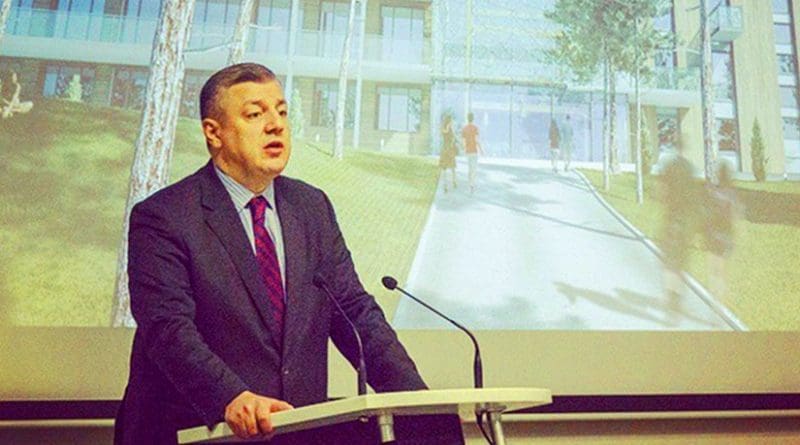Georgia: PM Kvirikashvili Speaks Of Foreign Policy Priorities
By Civil.Ge
(Civil.Ge) — In the face of global challenges, “one of the main prerequisites for Georgia’s success is well-thought and flexible diplomacy, capable of being adapted to fast changing international situation”, Prime Minister Giorgi Kvirikashvili told annual gathering of Georgian ambassadors in Tbilisi on July 26.
Recalling Parliament’s cross-party declaration of July 8, the PM said that despite of differences over domestic issues, “actually all the political forces are united over country’s foreign policy” course towards European and Euro-Atlantic integration.
“This course is the choice of our citizens and expresses aspiration of our society towards having the state based on democratic values centered around human, freedom and security and taking our dignified place in the European family,” he said, adding that Georgia has made an “important progress” on this path in recent years, noting Association Agreement and deep and comprehensive free trade treaty with the EU, adding that it is “only the beginning of integration to the EU.”
Expressing hope that EU visa waiver will be finalized in the nearest future, he said that it would mark “a turning point in the process of Georgia’s return back to the European family.”
“Therefore, all the possibilities should be used to finalize this issue in the shortest period of time,” the PM said.
On NATO, he said that “promises and support” Georgia received at the Warsaw summit earlier this month “reaffirms partnership between the Alliance and Georgia, which is unique with its depth and scale.”
“It also [reaffirms] our progress on the path of integration and inevitability of Georgia’s [NATO] membership,” he added.
The PM said that the memorandum on deepening the defense and security cooperation with the United States, signed during Secretary of State John Kerry’s visit to Georgia earlier this month, “creates completely new framework for partnership and involves areas, which are critically important for strengthening Georgia’s security and increasing its self-defense capabilities.”
“We think that there is more space and possibilities for strengthening cooperation with the United States in the areas ranging from security and economy to people-to-people contacts,” the PM said.
“Georgia invests a lot of efforts to fully utilize transit function of the country and to gain the role of regional hub, which, along with the economic benefit, will also bring more peace and stability to the entire region. More diplomatic efforts are required in this respect,” Kvirikashvili said.
In the condition of occupation of Georgia’s breakaway regions of Abkhazia and South Ossetia and “actual annexation” of these regions by Russia, “it is obviously impossible to speak about any progress” in relations with Moscow, he said.
The PM, however, also added: “But the result, which our pragmatic and balanced policy towards Russia has yielded and which has no alternative, is avoiding war and open armed confrontation amid continues provocations.”
“Regrettably that’s the reality we are living in and the change of this reality requires long-term, reasonable and consistent policy,” he said.
In his address to the ambassadorial meeting, President Giorgi Margvelashvili said that it is important to follow closely developments in the EU following Britain’s vote to leave the bloc, which, he said, “will naturally have influence on the European policies, as well as Europe’s policies towards its closest partners – very interesting and important perspectives may open up for Georgia in this regard.”

